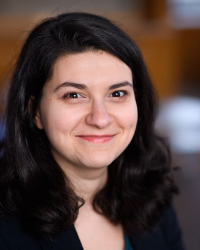APARC Names 2021-22 Shorenstein Postdoctoral Fellows
APARC Names 2021-22 Shorenstein Postdoctoral Fellows
Political scientist Dr. Diana Stanescu and sociologist Mary-Collier Wilks will join APARC as Shorenstein postdoctoral fellows on contemporary Asia for the 2021-22 academic year.

APARC is pleased to announce the appointment of political scientist Dr. Diana Stanescu and doctoral candidate in sociology Mary-Collier Wilks as our 2021-22 Shorenstein postdoctoral fellows on contemporary Asia. They will begin their appointments at Stanford in autumn 2021.
The Shorenstein Postdoctoral Fellowship on Contemporary Asia supports recent doctoral graduates dedicated to research and writing on contemporary Asia, primarily in the areas of political, economic, or social change in the Asia-Pacific, or international relations in the region.
Fellows develop their dissertations and other projects for publication, present their research, and participate in the intellectual life of APARC and Stanford at large. Our postdoctoral fellows often continue their careers at top universities and research organizations around the world and remain involved with research and publication activities at APARC.
Meet our new postdoctoral scholars:
Diana Stanescu
Research Project: Do Bureaucratic Networks Matter for Market Access? The Effect of Informal Connections on Trade and FDI of Japanese Firms.

Dr. Stanescu’s research interests include international trade, regulation, and lobbying with a focus on Japan. Using formal and quantitative methods, her research addresses the overarching question of how bureaucracies shape global economic governance, from a structural and agent-driven perspective. Her dissertation, “The Bureaucratic Politics of Foreign Economic Policymaking,” explains the mechanisms by which stakeholders shape international economic policy through bureaucratic channels of influence. Additional work looks at the micro-foundations of bureaucratic structure and its consequences for policy, examines the role of individual bureaucrats within domestic and international institutions, and develops micro-level data on bureaucratic careers and appointments.
At APARC, Stanescu will further assess how politicians and interest group representatives maneuver within bureaucratic channels to have influence over foreign economic policy. In particular, she will examine how bureaucratic-interest group networks help firms obtain market access abroad, with evidence from trade and foreign direct investment in Japan.
Mary-Collier Wilks
Research project: How do conceptions of gender, sexuality, and women’s advancement shape the construction of development knowledge and foreign aid?

It was Wilk’s work as a grant writer at a local NGO, Social Services of Cambodia, that first sparked her interests in globalization, gender, and the politics of international development. Having seen how resources and ideas from all over the world flow through NGOs to affect the lives of people in Cambodia, she began thinking about the complicated process of foreign aid and international development. She also gained experience as a consultant in the development sector, performing a gender analysis for a USAID health project and serving as a trainer for a USAID Women’s Leadership Conference.
For her dissertation, which is funded by the National Science Foundation and the Fulbright IIE, Wilks conducted a multi-sited ethnography comparing U.S. and Japanese international NGOs that advance women's health in Cambodia. Her work contributes to scholarly theories of global civil society and international development, contending that to adequately analyze and improve development outcomes, we must attend to national variation in international NGO programs and practices.
At APARC, Wilks will transform her dissertation manuscript into a book and extend her comparative research agenda to investigate how NGO practices are shaped by the business cultures in which their donors are embedded.
